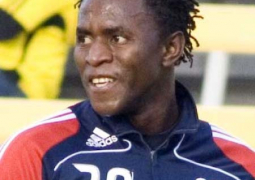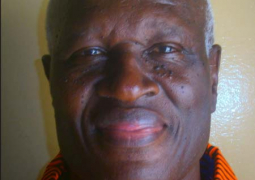The UNHCR,
S&d: Who would benefit from your distribution since refugee hosts would need seeds for themselves!
UNHCR Saho: Refugee farmers will benefit; that is Senegalese refugees based in Foni area, Western Region.
S&D: What type of seeds are you distributing to these refugee farmers?
UNHCR Saho: We are giving them groundnut, maize and sorghum. This will be distributed to over 145 families bought by UNHCR for distribution by UNHCR and their implementing partners, the Gambia Red Cross Society.
S&D: Is this your first time reaching out to refugees from that end?
UNHCR Saho: Oh no! This is not our first time. Last year we gave them a good consignment of seeds which they planted but it was unfortunate that the yield was no good so they had to loose the seeds. That is why this time round we came again to see that they get the seeds and plant them in good time, I am sure it will help them a lot and they will get plenty of harvest this time.
S&D: Do you have any aim for doing this?
UNHCR Saho: Yes! One of our aims is to create self-sufficiency among the rural refugees. Secondly, to reduce food insecurity stress in the refugee communities and to counter long term dependency on food aid.
S&D: How many refugees have you helped with seeds from last year to this distribution you are on now?
UNHCR Saho: in 2007, a total of 131 refugee farmers received similar assistance from UNHCR. However because of erratic rainfall pattern, the harvest was poor and the refugees continue needing food assistance.
The recipients themselves were bold to talk to the Point to express their happiness and sadness over their displaced situations and hoping for a settlement to return to where they know better. News had it that at a stage the fighting intensified in Casamance and the rebels turned against the poor farmers and started taking away their food or crops they had toiled for. They cut the ears of the farmers when they were not satisfied and in some cases they killed them at will. Some refugees have left their homes since 2006 and are seeing around the borders of
S&D: Where did you live in Casamance and when did you come?
Siaka Bojang: I come from Tokara and I left in August 16, 2006 to The Gambia. I have not been able to return since then due to the war there.
S&D: What are you going to do with the seeds UNHCR is giving you today?
Siaka Bojang: I have already brushed my farm plot, I am going to plant. I have built a house in Bajankoto and I have about twenty one siblings with me. We are going to work very hard on our farm to multiply the seeds given to us today. I have many people with me I am only appealing to UNHCR to increase the seeds to meet the needs of my twenty one siblings.
S&D: What would you do then in this case?
Siaka Bojang: "Contant toi de se que tu as." Meaning "You are happy as to what you have." If the seed is plenty then one gets more yield to live on, we are farmers we can do more to produce more if more is there. You know we are many in the house we cannot be on the same wave length with those who have small families.
S&D: What is your final word to UNHCR?
Siaka Bojang: To UNHCR I say, "Alam du lilai, a rabi ara min." Since we were in Casamance we were given seeds by WFP and every month we showed what we had. Our work will go on here with committees which will help the groups and individuals and we have committees from Bwiam to Faraba Sutu. If UNHCR gives us their ears a lot can be achieved as we are refugees. We are very happy and pleased that the refugees are been helped especially by the UNHCR boss, Mr. Sekou Saho and our hard working lady Fatou Barry, the Protection Officer. God will help and bless them for their relentless effort in helping us, not forgetting Lamin. Thank you.
Mansata Jarju, another refugee, a mother of several children represented her husband who was busy with their kids at home. She still remembers her home and recalled how she came since two years ago. I started by asking her how many of them were in their family.
Mansata Jarju: We are ten in our family and are all at home. My husband is with boys that have just been circumcised caring for them. We have been here for two years now.
S&D: Is this the first time UNHCR is giving you seeds to plant?
Mansata Jarju: No even last year we were given some seeds but the yield was poor due to the climate. We have been planting since we came here and thanks to God for what we have today. At the end of this farming season I shall be able to get more on top of what has been received from UNHCR today.
S&D: Any last words to UNHCR?
Mansata Jarju: Yes! They are very helpful and understanding. They made us feel at home and people respect us because we are not just sitting and idling but we are seeing doing something good for ourselves. And we shall continue to do well and shall return home with something substantial some day.
According to Fatou Barry, the Protection Officer at UNHCR during the registration and distribution says, "Food supplement is supplied by WFP these we are giving is for farming purposes. This shall continue until every one of the refugees receives enough for their planting." Their implementing partners, the Red Cross represented by Lamin, in charge of the distribution expressed satisfaction and enthusiasm during the distribution, as he compared last year's distribution that was marred by heavy rains.
UNHCR informs all refugees that Friday, 20th June, 2008 will be World Refugee Day. All refugees are invited at the Friendship Hotel at Bakau to commemorate the day. Be it Liberian, Sierra Leonean, Ivory Cost, Casamance or more should come.
Read Other Articles In Article (Archive)




